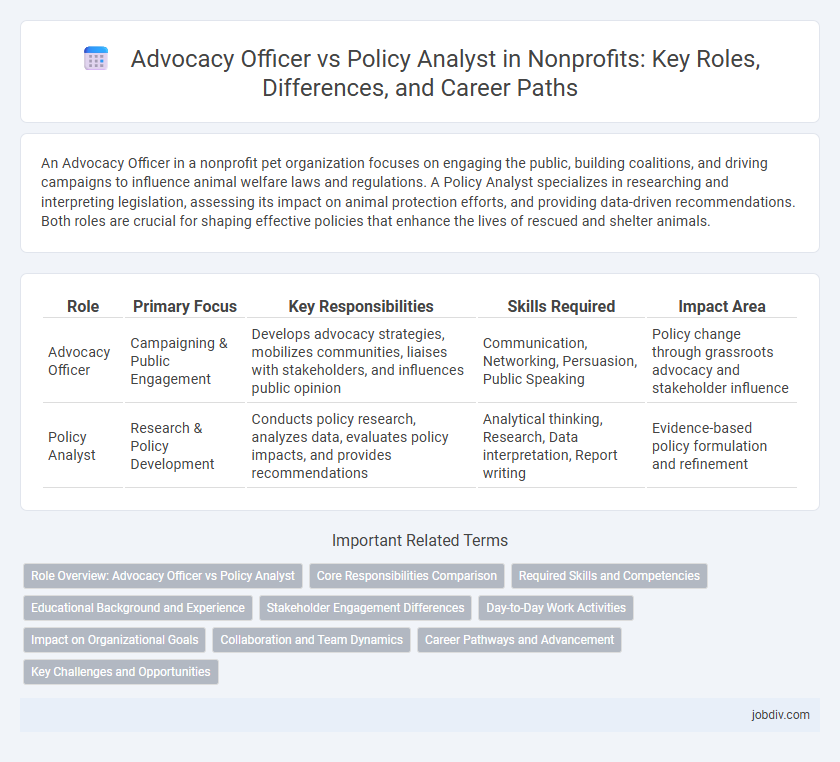An Advocacy Officer in a nonprofit pet organization focuses on engaging the public, building coalitions, and driving campaigns to influence animal welfare laws and regulations. A Policy Analyst specializes in researching and interpreting legislation, assessing its impact on animal protection efforts, and providing data-driven recommendations. Both roles are crucial for shaping effective policies that enhance the lives of rescued and shelter animals.
Table of Comparison
| Role | Primary Focus | Key Responsibilities | Skills Required | Impact Area |
|---|---|---|---|---|
| Advocacy Officer | Campaigning & Public Engagement | Develops advocacy strategies, mobilizes communities, liaises with stakeholders, and influences public opinion | Communication, Networking, Persuasion, Public Speaking | Policy change through grassroots advocacy and stakeholder influence |
| Policy Analyst | Research & Policy Development | Conducts policy research, analyzes data, evaluates policy impacts, and provides recommendations | Analytical thinking, Research, Data interpretation, Report writing | Evidence-based policy formulation and refinement |
Role Overview: Advocacy Officer vs Policy Analyst
An Advocacy Officer drives public support and mobilizes communities to influence policy changes, emphasizing grassroots engagement and communication strategies. A Policy Analyst conducts research and evaluates legislative proposals, providing data-driven recommendations to shape organizational and governmental policies. Both roles complement each other by combining advocacy efforts with rigorous policy analysis to advance nonprofit goals.
Core Responsibilities Comparison
Advocacy Officers primarily engage in mobilizing community support, crafting persuasive campaigns, and liaising with stakeholders to influence public opinion and legislative decisions. Policy Analysts concentrate on researching, evaluating, and interpreting data to develop evidence-based policy recommendations that guide organizational strategies. Both roles require deep understanding of legislative processes but differ in focus: Advocacy Officers drive action and engagement, while Policy Analysts provide the analytical foundation for informed decision-making.
Required Skills and Competencies
Advocacy Officers require strong communication, public speaking, and stakeholder engagement skills to effectively promote causes and mobilize support within nonprofit sectors. Policy Analysts need advanced research, data analysis, and critical thinking competencies to evaluate policies and provide evidence-based recommendations. Both roles demand proficiency in policy knowledge, strategic planning, and the ability to influence decision-makers in nonprofit advocacy and policy development.
Educational Background and Experience
An Advocacy Officer typically holds a degree in social sciences, communications, or public policy, combined with hands-on experience in community organizing and stakeholder engagement within nonprofit sectors. A Policy Analyst usually possesses advanced education, such as a master's degree in public administration or political science, along with expertise in research methodologies, data analysis, and legislative processes. Both roles benefit from strong knowledge of nonprofit regulations, but the Advocacy Officer leans more toward fieldwork and advocacy campaigns, whereas the Policy Analyst focuses on data-driven policy development and evaluation.
Stakeholder Engagement Differences
Advocacy Officers prioritize direct interaction with community groups, government agencies, and media to mobilize support and influence public opinion, emphasizing relationship-building and communication skills. Policy Analysts focus on researching, evaluating, and interpreting policy impacts to inform decision-makers, relying on data analysis and strategic recommendations. Stakeholder engagement for Advocacy Officers is active and outward-facing, while Policy Analysts engage stakeholders primarily through evidence-based consultations and expert collaborations.
Day-to-Day Work Activities
Advocacy Officers engage directly with stakeholders to promote organizational causes, organize campaigns, and mobilize community support through events and communication strategies. Policy Analysts conduct thorough research, analyze legislative developments, and prepare detailed reports to inform decision-makers and guide organizational strategies. Both roles require collaboration with government agencies, but Advocacy Officers emphasize external engagement while Policy Analysts focus on internal policy evaluation and recommendation.
Impact on Organizational Goals
Advocacy Officers drive organizational goals by mobilizing community support and influencing public opinion, directly shaping policy outcomes aligned with the nonprofit's mission. Policy Analysts provide in-depth research and data analysis to inform strategic decisions and craft evidence-based policy recommendations, enhancing the organization's credibility and long-term effectiveness. Both roles are critical, with Advocacy Officers focusing on external engagement and Policy Analysts strengthening internal policy frameworks.
Collaboration and Team Dynamics
Advocacy Officers and Policy Analysts in nonprofits often collaborate closely to drive mission-aligned policy change, with Advocacy Officers focusing on community engagement and stakeholder communication while Policy Analysts provide data-driven insights and policy recommendations. Effective team dynamics hinge on clear role delineation, regular interdisciplinary meetings, and shared goals to ensure advocacy strategies are evidence-based and impactful. Leveraging diverse expertise enhances organizational capacity to influence legislative processes and mobilize support for social causes.
Career Pathways and Advancement
An Advocacy Officer in a nonprofit typically focuses on grassroots mobilization, stakeholder engagement, and public campaigns to influence policy change, often advancing by gaining leadership roles in advocacy or community organizing. A Policy Analyst specializes in researching, analyzing, and evaluating public policies, with career progression centered on senior analytical roles or strategic advisory positions within think tanks or governmental affairs. Both career paths demand strong communication and research skills, but the Advocacy Officer leans toward external impact and coalition-building, while the Policy Analyst emphasizes internal policy development and evidence-based decision-making.
Key Challenges and Opportunities
Advocacy Officers face the challenge of mobilizing public support and influencing policymakers in highly competitive and polarized environments while leveraging grassroots networks to drive social change. Policy Analysts must navigate complex data interpretation and regulatory frameworks, offering evidence-based recommendations that shape effective nonprofit strategies. Both roles present opportunities to impact legislation and promote mission-driven initiatives, requiring strong communication skills and strategic thinking to align advocacy efforts with policy development.
Advocacy Officer vs Policy Analyst Infographic

 jobdiv.com
jobdiv.com